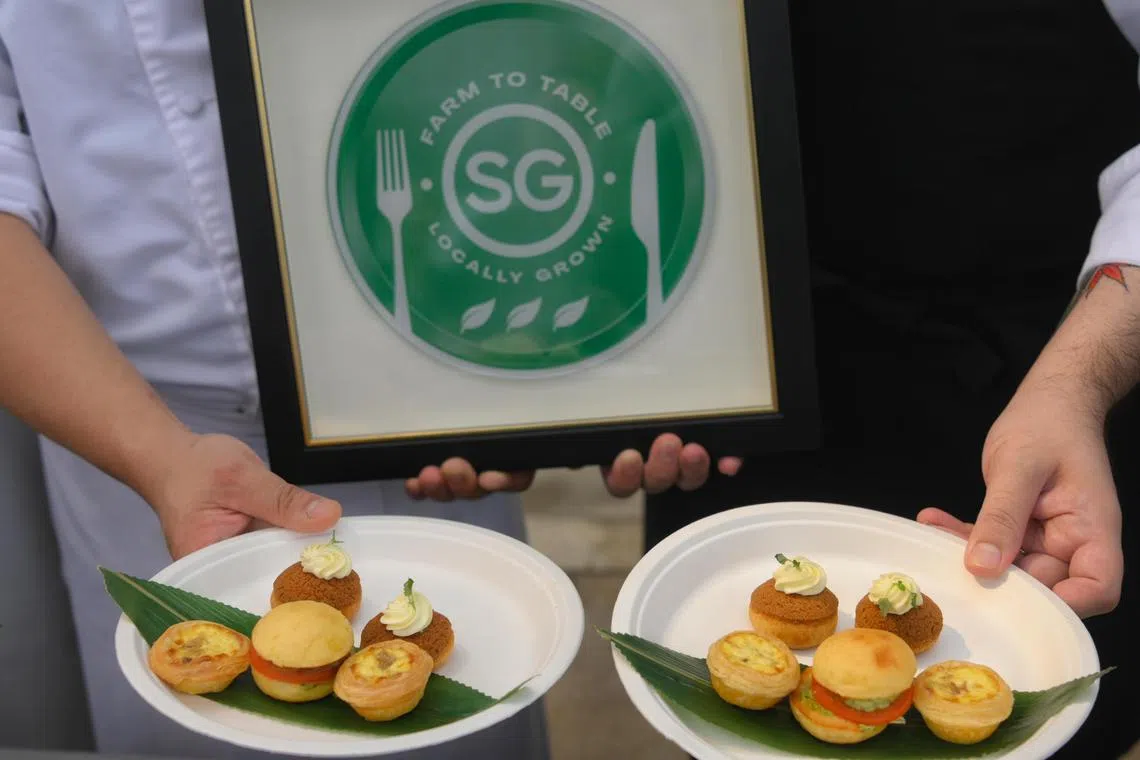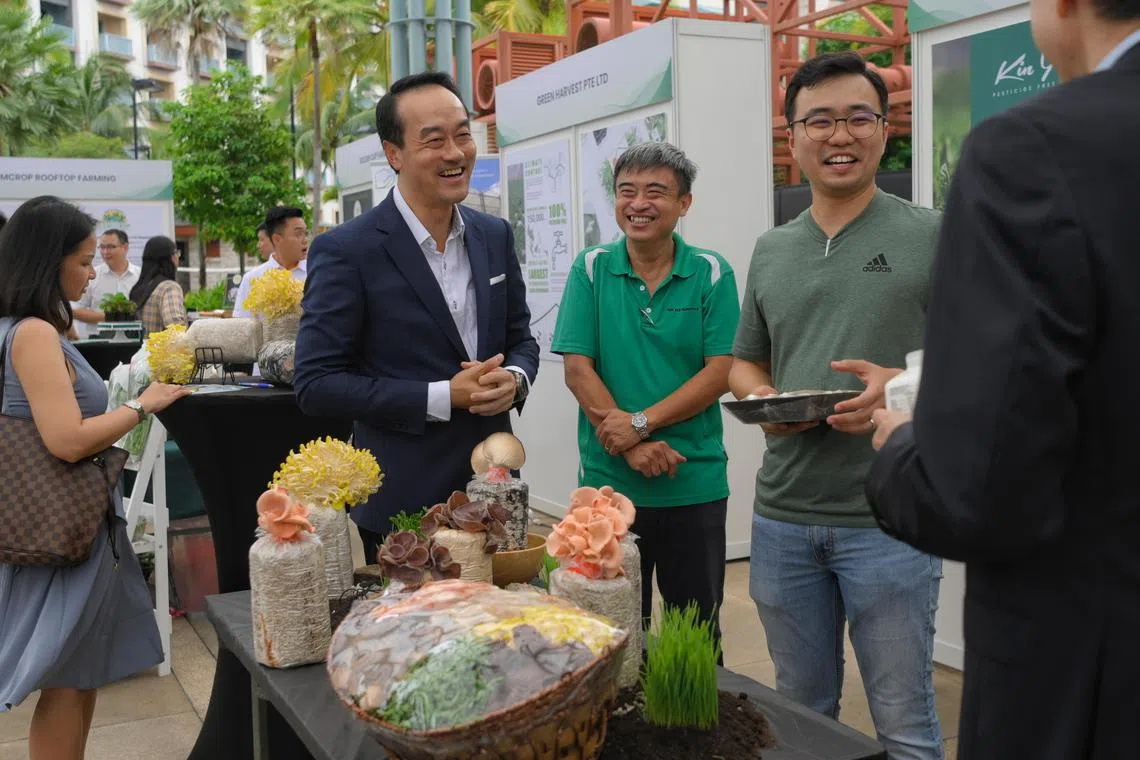New recognition scheme for hotels and food businesses that use local veggies, fish and eggs
Sign up now: Get ST's newsletters delivered to your inbox

Chefs from Resorts World Sentosa with some dishes using locally sourced ingredients at the launch of the Farm-to-Table Recogniton Programme on March 27, 2023.
ST PHOTO: MARK CHEONG
SINGAPORE - Eleven hotels, restaurants and caterers were recognised on Monday for sourcing a portion of their food ingredients from local farms.
They are the pioneering group of food businesses under the new Farm-to-Table (FTT) Recognition Programme, which was created by the Singapore Food Agency (SFA) and local associations to encourage more restaurants and eateries to opt for local vegetables, fish and eggs.
The 11 recipients, which include catering firms Foodtalks Caterer and Manufacturer, and Kitchen Haus Group, as well as Resorts World Sentosa (RWS), received the FTT Recognition Programme logo.
Local vegetable and fish farms have said they need support and consistent demand from local consumers and food businesses to stay commercially viable.
A few vegetable farms have told The Straits Times that they have had to throw or donate a portion of their leafy greens due to slow sales. Others have had to scale down production to prevent wastage.
Locally grown greens contributed to 4.3 per cent of vegetables consumed in Singapore
The new recognition programme is open to hotels, restaurants and caterers that source at least 15 per cent of their fresh produce, in dollar value, from local farms.
With three award tiers under the programme, businesses that source more types of local produce will be given a higher award tier.
The programme was formed by SFA, the Association of Catering Professionals Singapore, the Restaurant Association of Singapore and the Singapore Hotel Association.
Businesses looking to apply for the programme can visit , with each award valid for two years.
Speaking at the award ceremony at RWS on Monday, Senior Minister of State for Sustainability and the Environment Koh Poh Koon said: “As we work on supply-side measures to increase local production, equally important is the corresponding demand to complement that. These perishable items cannot just be left on the shelf for months.
Dr Koh added that it must make financial sense for farmers here to produce more, and the market signal must come from consumers.

Senior Minister of State for Sustainability and the Environment Koh Poh Koon (left) speaking to Kin Yan Pesticide Free Farm’s senior farmer manager See Jen Chuan (centre) and farm manager Ng Zhen Khan.
ST PHOTO: MARK CHEONG
Six of the 11 recipients received the base tier award for sourcing one type of food. For many of them, it was eggs.
Eggs form the biggest volume of home-grown produce, accounting for about 30 per cent of eggs in the market here.
Mr Patrick Chan, chief executive of Kitchen Haus Group, said: “The quality of local eggs is comparable to imported eggs, with only a slight increase in pricing.”
Some caterers and restaurants are still in the early stages of sourcing home-grown vegetables and fish.
Foodtalks Caterer and Manufacturer, almost all of whose egg supply is local, is looking to expand to bean sprouts next.
The company’s managing director Kelvin Ng said: “Unlike seafood and leafy vegetables, which are likely to have supply issues due to the amount of volume caterers need, we feel bean sprouts are achievable as they form a specific dish on their own.”
Foodtalks is currently discussing with a farm here the possibility of replacing the company’s imported salad greens with local produce.
Similarly, Kitchen Haus Group, which imports mainly dory fish, is planning to obtain locally farmed barramundi fillet in the coming years to reduce its carbon footprint.
As for vegetables, Mr Chan said: “We use up to one tonne of vegetables per day, and the current variety of local vegetables is not able to meet our range of requirements, which include broccoli and cauliflower.
“Local veggies are also more expensive.”
In February, the local agri-food sector and SFA formed a coalition, called the Alliance for Action, to help generate consistent demand from commercial players for local produce.
While discussions are in the works, one of the solutions may be a common platform for local farms to supply produce to those in the hotels, restaurants and catering sector.
Commercial rooftop farm ComCrop’s chief executive Peter Barber, a member of the alliance, said: “We want to create new opportunities and markets to collectively increase production. Many commercial entities don’t know what varieties of food are available from Singapore producers.”
Those given the highest-tier award for having three local food types on their menus include RWS and Gardenasia, which runs The Local Farm Bistro.

Fish and chips served at Gardenasia's The Local Farm Bistro. The vegetables are sourced from Sustenir and the fish is obtained from The Fish Farmer.
Gardenasia/The Local Farm
Every year, RWS procures more than 45 tonnes of local produce – such as barramundi, eggs, mixed greens and cress – which are used in the integrated resort’s dining establishments and at conferences.
Supporting local farms is part of RWS’ sustainable tourism move, and it helps them avoid global food supply disruptions caused by geopolitical developments and price fluctuations, said its senior vice-president of attractions and sustainability Loh Su Kim.

(Front to back) Craquelin choux, a slow-baked Singapore barramundi slider, and a mushroom and baby spinach quiche, all made with locally sourced ingredients at Resorts World Sentosa.
ST PHOTO: MARK CHEONG
Gardenasia director and principal consultant Kenny Eng said eateries here should be creative with their use of local produce in their dishes, and this could influence consumers to buy local.
“Given enough time, I believe demand for local produce will be mainstreamed, just as issues of climate action and sustainability currently are.”



